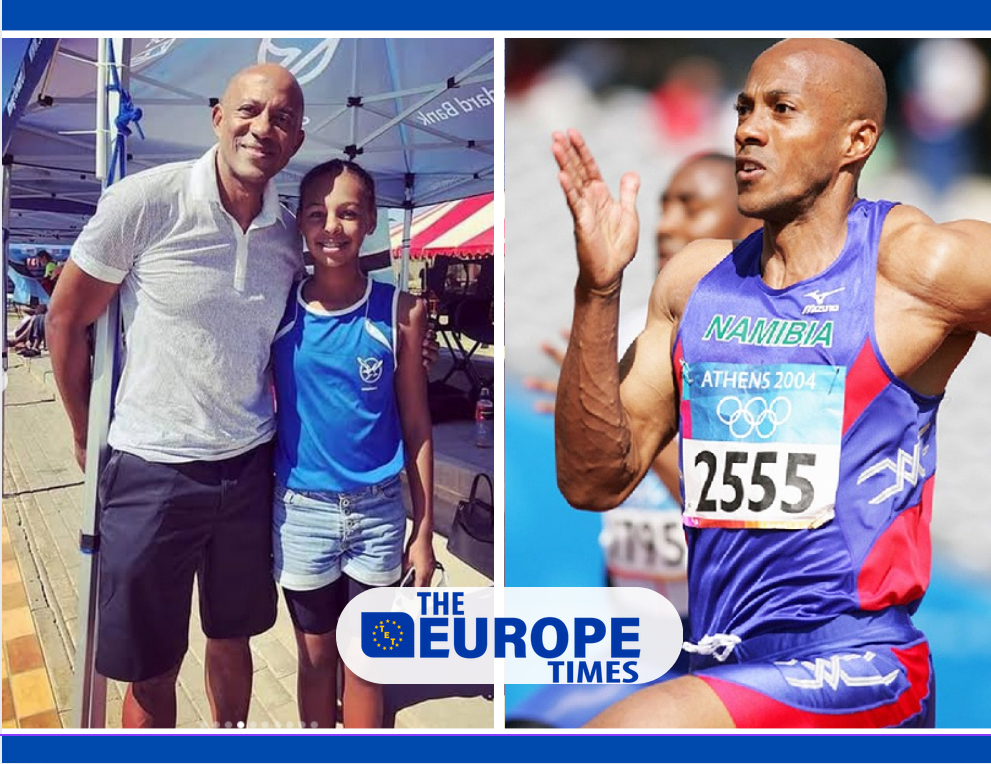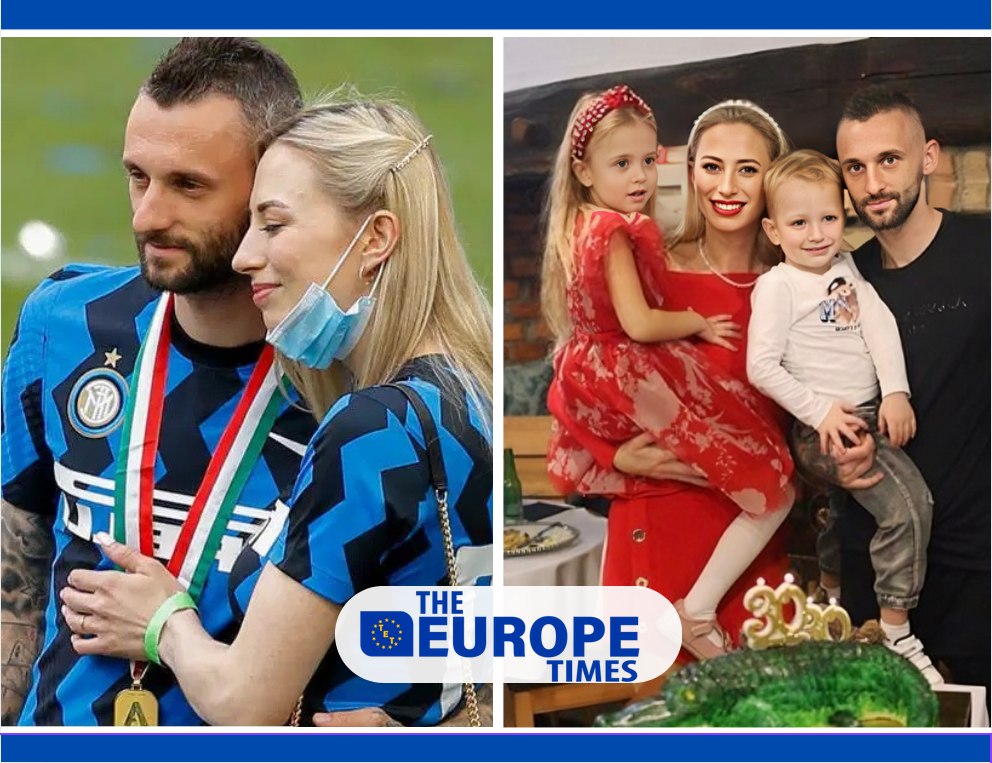Few athletes have left as powerful a mark on African athletics as Frankie Fredericks. Known for his speed, humility, and consistency, Fredericks became Namibia’s first Olympic medalist and one of the most respected sprinters of the 1990s. Competing in both the 100m and 200m events, he won four Olympic silver medals and earned global respect for his sportsmanship.
Beyond the track, Frankie Fredericks has played an influential role in developing sports administration across Africa and the world. His life story — from humble beginnings in Windhoek, Namibia, to international stardom — continues to inspire generations of athletes.
| Full Name | Frank “Frankie” Fredericks |
|---|---|
| Born | October 2, 1967, Windhoek, Namibia |
| Nationality | Namibian |
| Height | 1.80 m (5 ft 11 in) |
| Education | Brigham Young University (BYU), USA |
| Sport | Track and Field (100m, 200m) |
| Spouse | Jessica Fredericks |
| Olympic Medals | 4 Silver Medals (1992, 1996) |
| Notable Achievements | 200m World Champion (1993), Commonwealth Champion |
| Career Span | 1988–2004 |
| Post-Athletic Role | IOC Member, Sports Administrator |
| Known For | Being Namibia’s first Olympic medalist and African sprint pioneer |
Early Life and Background
Childhood and Family Roots in Windhoek, Namibia
Frankie Fredericks was born on October 2, 1967, in Windhoek, during a time when Namibia was still under South African rule. Growing up, he faced social and economic challenges but also developed a deep appreciation for perseverance and discipline. His early years were defined by curiosity, hard work, and a growing love for sports — particularly running, which would soon become his life’s calling.
Early Passion for Athletics and Sports Influence
Fredericks displayed athletic potential at an early age, competing in local school competitions and showing remarkable natural speed. While Namibia lacked major sports infrastructure at the time, he honed his skills with determination and creativity. His early mentors noticed his talent, encouraging him to pursue athletics seriously — a decision that would eventually make him a continental icon.
Education and Early Development
Academic Journey at Brigham Young University
A turning point in Frankie Fredericks’ journey came when he earned a scholarship to attend Brigham Young University (BYU) in Provo, Utah, in the United States. There, he studied Computer Science and Business Communication, balancing academics with athletic training.
At BYU, Fredericks trained under elite coaches and gained access to world-class facilities, transforming from a promising local sprinter into an internationally competitive athlete.
Transition from Student to Competitive Athlete
While excelling academically, Fredericks began competing in major college meets, quickly making a name for himself as one of the fastest men in collegiate athletics. His time at BYU helped shape both his athletic technique and mental discipline, setting the stage for his global breakout.
Rise in Track and Field
Frankie Fredericks’ Early Competitions and Breakthrough Moments
Fredericks’ rise was steady and impressive. After Namibia’s independence in 1990, he began representing the country in international competitions. His early victories at African and European meets showcased his potential to compete with the best sprinters in the world.
Joining the International Athletics Stage
By the early 1990s, Frankie Fredericks was a recognized name in track and field circles. His combination of explosive starts, powerful strides, and consistent top finishes made him one of the most formidable opponents on the sprinting circuit.
Olympic Career Highlights
1992 Barcelona Olympics — First Silver for Namibia
At the 1992 Barcelona Olympic Games, Fredericks made history. Competing in the 100m and 200m, he won silver medals in both events, finishing just behind Linford Christie (100m) and Michael Marsh (200m).
These victories marked Namibia’s first-ever Olympic medals, instantly establishing him as a national hero.
1996 Atlanta Olympics — Double Silver Success
Four years later, at the Atlanta Olympics, Fredericks once again claimed silver in both sprint events, finishing behind Donovan Bailey (100m) and Michael Johnson (200m). His ability to perform consistently on the world’s biggest stage cemented his legacy as one of the most dependable sprinters of his generation.
Later Olympic Appearances and Consistent Performance
Fredericks competed in the 2000 Sydney Olympics and 2004 Athens Olympics, though he did not medal. Nevertheless, his enduring presence among the world’s elite sprinters highlighted his longevity, professionalism, and athletic discipline.
World Championships and Other Major Competitions
World Championships Glory in the 200m
At the 1993 World Championships in Stuttgart, Fredericks achieved one of his career highlights — winning gold in the 200m. This victory positioned him among the world’s best and showcased his technical perfection and mental focus.
Commonwealth and African Championships Success
In addition to his Olympic and World Championship performances, Fredericks claimed multiple titles at the Commonwealth Games, African Championships, and IAAF Grand Prix Finals. These victories strengthened his reputation as a dominant sprinter representing Africa on the global stage.
Records and Achievements
National and World Records Set by Frankie Fredericks
Throughout his career, Fredericks set several Namibian national records, many of which still stand. His personal best times include:
- 100m: 9.86 seconds
- 200m: 19.68 seconds (then one of the fastest times in history)
These performances made him one of only a few athletes to remain competitive in both sprint events for over a decade.
Ranking Among the Greatest Sprinters of the 1990s
During the 1990s, Frankie Fredericks competed alongside legends such as Carl Lewis, Michael Johnson, and Donovan Bailey. His consistency, discipline, and sportsmanship earned him a place among the all-time greats — particularly as a trailblazer for African sprinters.
Style, Training, and Athletic Technique
Sprinting Technique and Physical Preparation
Fredericks was renowned for his smooth running form, explosive starts, and technical precision. Unlike many of his peers, he combined power with efficiency, enabling him to maintain top speed longer than most. His training involved intensive strength work, sprint drills, and recovery-focused routines that emphasized balance and injury prevention.
Coaching, Mentorship, and Training Philosophy
He credited much of his success to his coaches and mentors, who helped him maintain focus and discipline throughout his career. Even after retiring, Fredericks shared his insights with young athletes, promoting the values of hard work, respect, and integrity.
Personal Life and Family
Marriage to Jessica Fredericks
Frankie Fredericks is married to Jessica Fredericks, and the couple has maintained a private yet supportive partnership. Jessica played an important role during his athletic career, accompanying him through competitions and public commitments.
Balancing Career, Family, and International Commitments
Despite a demanding schedule, Fredericks prioritized family life, often speaking about the importance of maintaining personal balance amid professional pressures. His humility and grounded nature reflect his family-centered upbringing.
Retirement and Life After Athletics
Transition from Athlete to Sports Administrator
After retiring from competitive athletics in 2004, Frankie Fredericks turned his attention to sports governance. He joined the International Olympic Committee (IOC) and became a member of the IAAF Athletes’ Commission, later serving on multiple Olympic committees.
Role in the International Olympic Committee (IOC)
Fredericks worked within the IOC to improve athlete representation, promote transparency, and support African sports development. His contributions earned him widespread respect beyond the track.
Business, Philanthropy, and Sports Development
Contributions to Namibian Sports and Youth Empowerment
Through his foundation and advocacy, Fredericks has promoted youth athletics programs in Namibia. He has helped fund facilities, sponsor young sprinters, and encourage education through sports — believing that opportunity and discipline can transform lives.
Involvement in Global Athletics Governance
Fredericks also played key roles in Athletics Namibia, World Athletics councils, and international mentoring programs. His post-competition work has solidified his reputation as a leader and visionary for sports development across Africa.
Controversies and Challenges
IOC Ethics Investigation — Facts and Resolution
In 2017, Fredericks was temporarily suspended by the IOC Ethics Commission over allegations related to payments during a Rio Olympics vote process. He strongly denied wrongdoing, and investigations eventually concluded without criminal conviction.
Despite the controversy, Fredericks maintained dignity and transparency, later returning to focus on sports development and mentoring.
Maintaining Integrity and Legacy
Even amid scrutiny, Frankie Fredericks remains respected for his lifelong commitment to ethical leadership and fair play. His reputation as a model athlete endures among fans and peers alike.
Awards, Honors, and Recognition
National Honors and Global Acknowledgment
Frankie Fredericks has received numerous awards, including:
- Namibian Sportsman of the Year (multiple years)
- World Athletics Fair Play Award
- Commonwealth Games Medal of Honor
His contributions extend beyond sports, symbolizing Namibian national pride and unity.
Frankie Fredericks’ Lasting Impact on African Athletics
As one of the first Africans to consistently challenge global sprinting dominance, Fredericks paved the way for stars like Usain Bolt, Christine Mboma, and Wayde van Niekerk. His legacy is that of a pioneer who redefined Africa’s place in world athletics.
Legacy and Influence
Inspiring Future Namibian Athletes like Christine Mboma
Fredericks’ success directly inspired Namibia’s next generation, including Christine Mboma, who won an Olympic silver in 2020 — nearly three decades after Fredericks’ triumphs. His mentorship and example continue to shape young athletes’ aspirations.
Contributions to Global Track and Field
Globally, Fredericks is remembered not just as a medalist, but as a symbol of consistency, fairness, and perseverance. His approach to life and athletics embodies the true Olympic spirit.
Frankie Fredericks in Media and Public Life
Interviews, Public Speaking, and Media Presence
As an articulate and thoughtful speaker, Fredericks frequently participates in motivational events, sports conferences, and Olympic forums. His insights into athlete mental health, training, and post-career transitions make him a respected voice in global sports discourse.
Current Life and Activities
Where is Frankie Fredericks Now (As of 2025)?
As of 2025, Frankie Fredericks remains active in sports development and advocacy. Living between Namibia and Europe, he participates in Olympic committees, mentoring initiatives, and youth programs. He continues to represent excellence, humility, and service — traits that define both his athletic and personal legacy.
Conclusion — The Timeless Legacy of Frankie Fredericks
Frankie Fredericks will forever be remembered as a trailblazer for Namibian and African athletics. From his historic Olympic silvers to his dedication to sports governance, his story reflects discipline, perseverance, and leadership. Beyond medals and records, Fredericks’ greatest achievement may be the generations he has inspired to believe that greatness is possible — no matter where you start.
FAQs About Frankie Fredericks
1. Who is Frankie Fredericks?
Frankie Fredericks is a retired Namibian sprinter and Olympic legend known for his success in the 100m and 200m events during the 1990s.
2. How many Olympic medals did Frankie Fredericks win?
He won four Olympic silver medals — two in 1992 (Barcelona) and two in 1996 (Atlanta).
3. What is Frankie Fredericks’ personal best time?
His personal bests are 9.86 seconds in the 100m and 19.68 seconds in the 200m.
4. Is Frankie Fredericks married?
Yes, he is married to Jessica Fredericks.
5. What did Frankie Fredericks do after retiring?
He became a sports administrator, IOC member, and advocate for youth development and athletics governance.
6. What controversies was he involved in?
In 2017, he faced an IOC investigation regarding ethics allegations, which were later resolved without conviction.
7. What is Frankie Fredericks’ legacy?
He remains Namibia’s first Olympic medalist and a symbol of African athletic excellence.
For More Update and Stories Visit: The Europe Times











